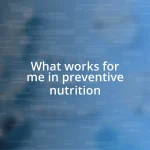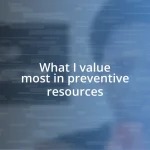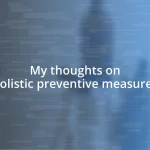Key takeaways:
- Mental and emotional health are just as important as physical health; vulnerability and seeking help are strengths, not weaknesses.
- Preventive care, including regular check-ups and vaccinations, is essential for identifying health issues early and ensuring overall well-being.
- Nutrition plays a critical role in health; balanced diets and understanding the body’s unique needs can significantly impact energy and mood.
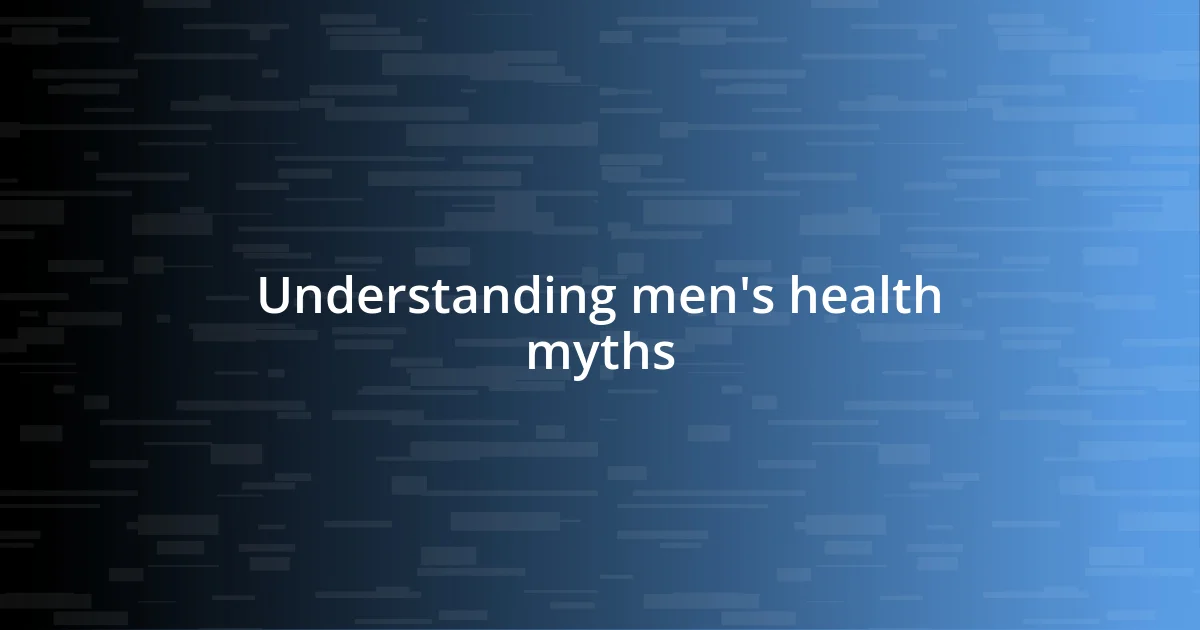
Understanding men’s health myths
Men’s health myths often stem from societal expectations and outdated notions about masculinity. I remember having a conversation with a close friend who believed that admitting to stress or anxiety was a sign of weakness. It was eye-opening to see how deeply ingrained these misconceptions can be, preventing men from seeking help and leading to significant health challenges.
Many believe that if a man appears fit on the outside, he must be healthy on the inside. But, as I’ve come to realize, health is multifaceted. It’s not just about physical appearance; mental and emotional health are equally vital. Have you ever noticed how some of the strongest guys I know struggle with their mental health? It’s a stark reminder that we need to redefine what health means for men and focus on the whole person rather than a narrow definition linked to strength or endurance.
There’s also a prevalent myth that men should avoid regular health check-ups and screenings. I used to think that I only needed a doctor when something felt seriously wrong. However, I learned that proactive health measures can catch issues early, often making a world of difference. Why wait until a problem arises when you can take charge of your health right now?
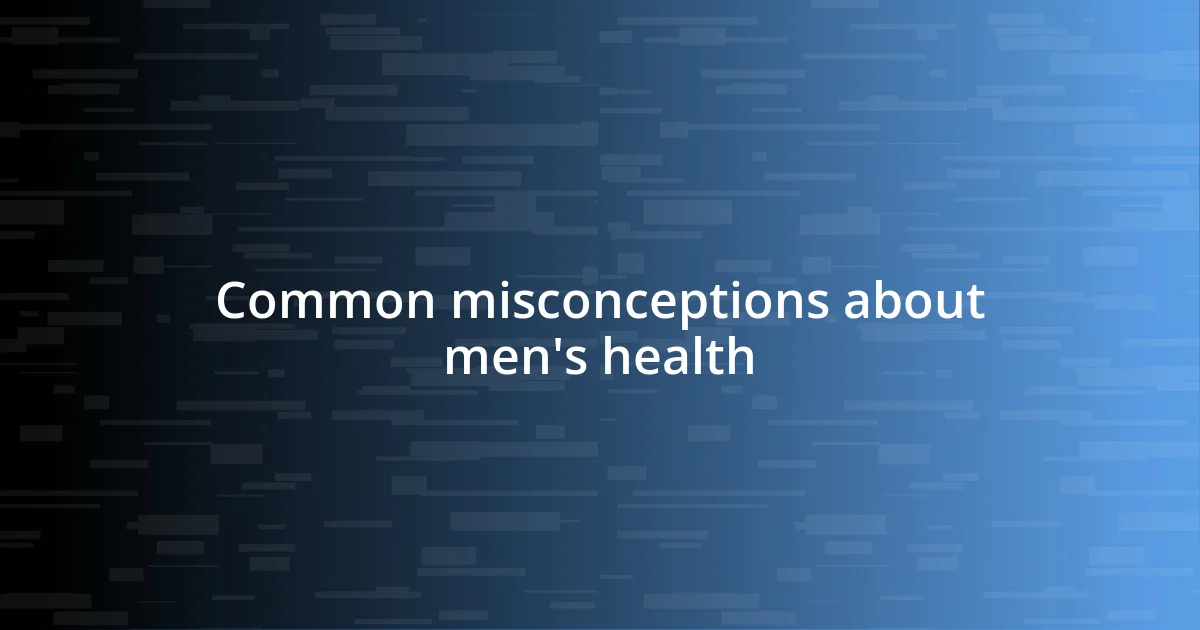
Common misconceptions about men’s health
It’s fascinating how misconceptions about men’s health can misguide so many of us. For instance, I once thought that only older men faced serious health risks. But when I heard about a friend in his late twenties experiencing high cholesterol, it hit me hard. It just goes to show that age shouldn’t blind us to health risks.
Here are some common myths that we often accept without question:
- Men don’t need to talk about their health. Many believe expressing vulnerability is a weakness, yet I’ve found that sharing struggles can strengthen bonds with friends.
- Only heavy drinkers face liver issues. I’ve learned that even moderate drinking can lead to problems, as one too many can quickly become too often.
- Mental health isn’t a priority. I remember dismissing my own anxiety until I realized neglecting it affected my relationships and overall well-being.
- Pain is just a part of being a man. This myth kept me quiet about my back pain until I finally sought help, only to discover how much better I could feel.
- Fitness equals good health. It was a wake-up call when I learned that fitness isn’t just physical; we need to care for our mental and emotional health, too.
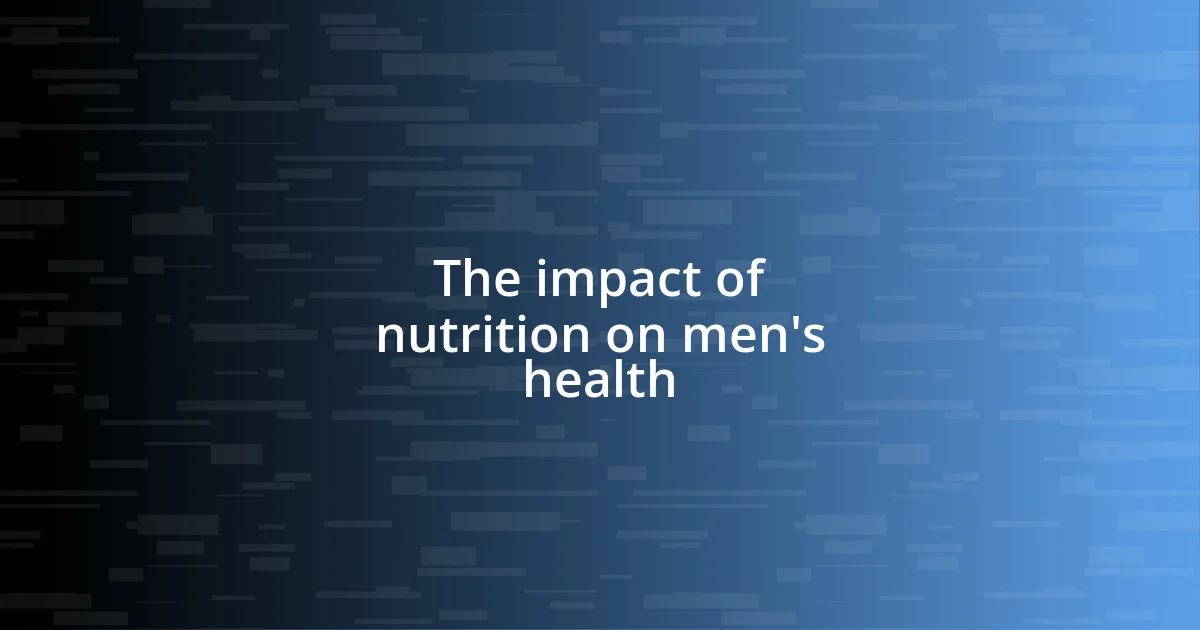
The impact of nutrition on men’s health
Understanding the impact of nutrition on men’s health has been a journey for me. For years, I believed that I could outwork poor eating habits. But after a week-long food journal, it became undeniable just how much what I consumed affected my energy levels and mood. Eating a balanced diet filled with fruits, vegetables, lean proteins, and whole grains has transformed not just my physical health but also my mental clarity. Have you ever considered how your meals influence your daily mindset?
One common myth I encountered was the idea that carbs are the enemy. I remember swapping out my beloved pasta for a diet rich in protein without realizing that healthy carbs can actually fuel my workouts and recovery. It’s essential to distinguish between processed carbs and their whole-food counterparts. They play an important role in providing energy, especially for active lifestyles, and I found that my focus and performance improved significantly when I embraced them in moderation.
When considering supplements, I used to feel overwhelmed by the vast array of options available. One friend swore by multivitamins, while another was adamant that just eating whole foods was enough. After some research and personal trial, I’ve concluded that while supplements can be beneficial, they shouldn’t replace a nutritious diet. For example, I once took a vitamin D supplement only to discover that including foods rich in this nutrient, like fatty fish and fortified dairy, gave me a more sustained energy boost throughout the day.
| Nutrient | Impact on Men’s Health |
|---|---|
| Protein | Supports muscle repair, regulates hormones, and promotes satiety. |
| Healthy Fats | Essential for brain health and hormone production, aiding in overall wellness. |
| Vitamins & Minerals | Boost immune function and support energy levels, impacting daily performance. |
| Water | Crucial for hydration, affecting energy levels and cognitive function. |
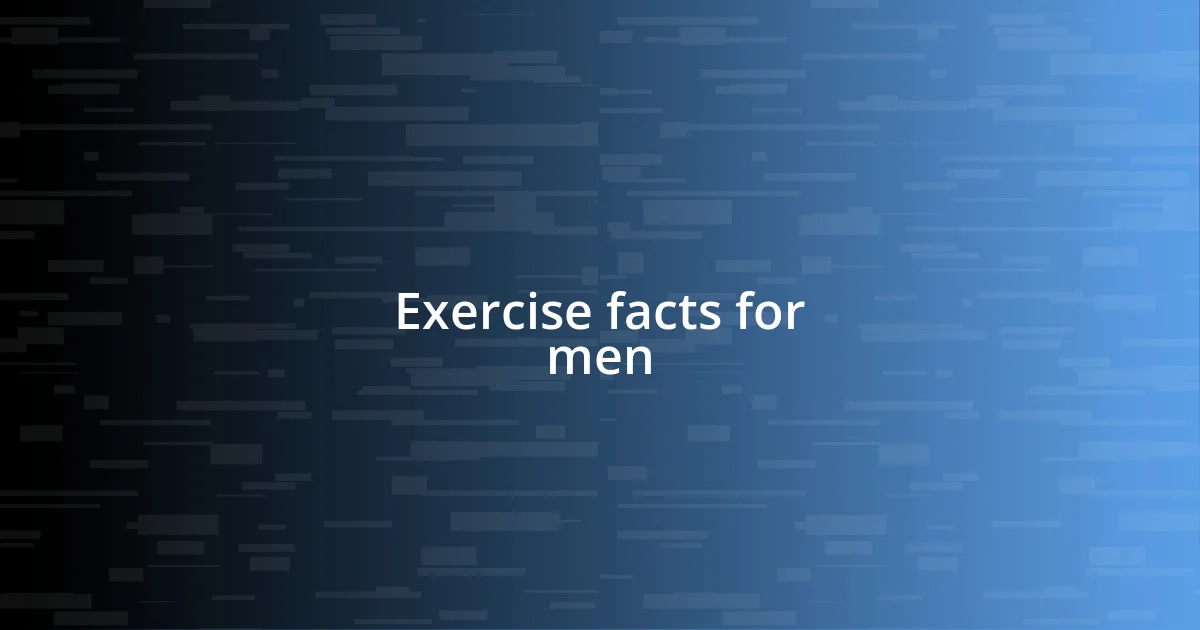
Exercise facts for men
Exercise is not just about building muscle; it’s a vital component of men’s overall health. I remember a time when I was solely focused on lifting weights and neglected cardio. It wasn’t until I struggled to keep up during a group hike that I realized, oh wow, cardiovascular fitness is just as essential. By incorporating different types of exercises, I noticed substantial improvements in my stamina and energy levels throughout the day. Have you ever felt that boost after a good run or even a brisk walk?
Interestingly, many men mistakenly think that they need to spend hours at the gym to see results. I was once caught in that mindset, convinced that if I wasn’t drenched in sweat for an hour, I wasn’t working hard enough. However, I’ve discovered that shorter, high-intensity workouts can be incredibly effective, saving time while still delivering fantastic results. It truly changed my routine, allowing me to maintain consistency, which I found leads to better long-term health.
Additionally, the role of exercise in mental health cannot be overstated. I used to dismiss the notion that working out could improve my mood, but after a particularly stressful week, I tried a quick workout after work. To my surprise, I emerged feeling lighter, almost as if I had shed my worries along with the sweat. It’s moments like these that remind me: exercise isn’t just physical – it has a profound impact on our mental well-being. Have you experienced that mental clarity post-workout?
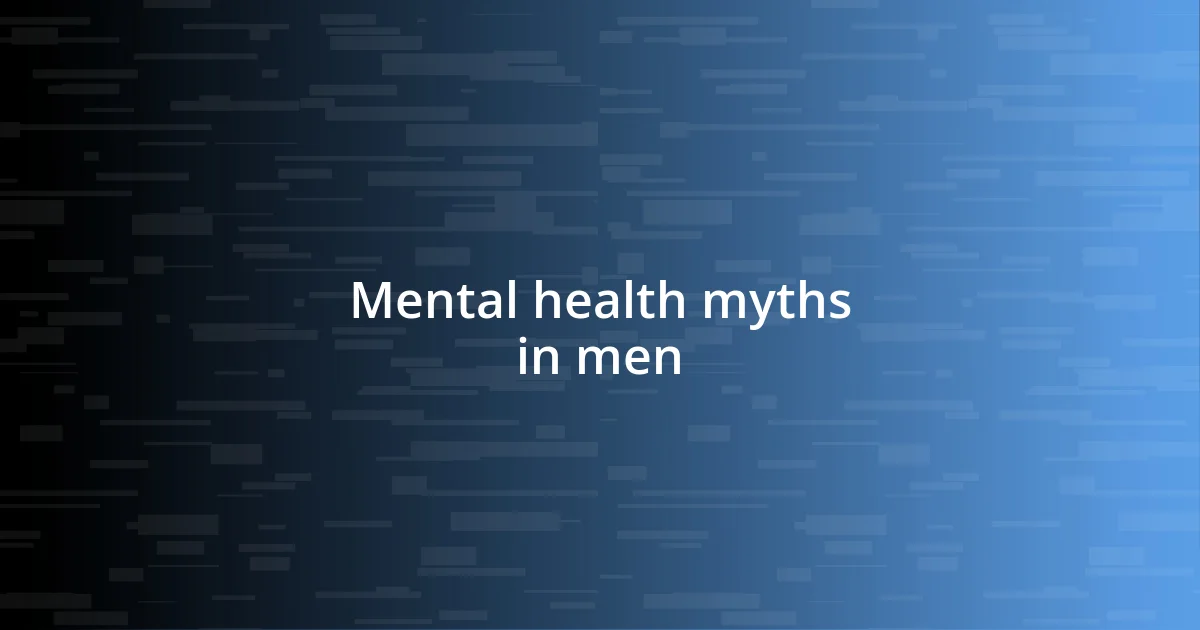
Mental health myths in men
When it comes to mental health, many people still believe that men should just “tough it out.” I used to think that expressing any sign of emotional struggle made me weak. However, I’ve learned firsthand that vulnerability is actually a strength. Opening up about my feelings not only freed me from an internal struggle but also helped me connect with others who felt the same. Have you ever stayed silent when you really needed to share?
Another persistent myth is that mental health issues are a sign of failure or weakness. I remember a particular phase in my life when battling anxiety felt like a daunting task. The stigma I felt was heavy; it made seeking help seem like admitting defeat. Yet, reaching out for support—whether through therapy or talking to friends—was a crucial step in reclaiming my life. Why do many men still hesitate to seek help?
Lastly, the belief that mental health challenges will just resolve on their own is one many buy into. I certainly did at one point, hoping my stress would simply fade if I ignored it long enough. It wasn’t until I actively engaged in mental health practices, like mindfulness and journaling, that I realized the importance of taking proactive steps for my well-being. It’s easy to think we can handle things, but I’ve found that being proactive makes all the difference. Have you taken time to check in with yourself lately?
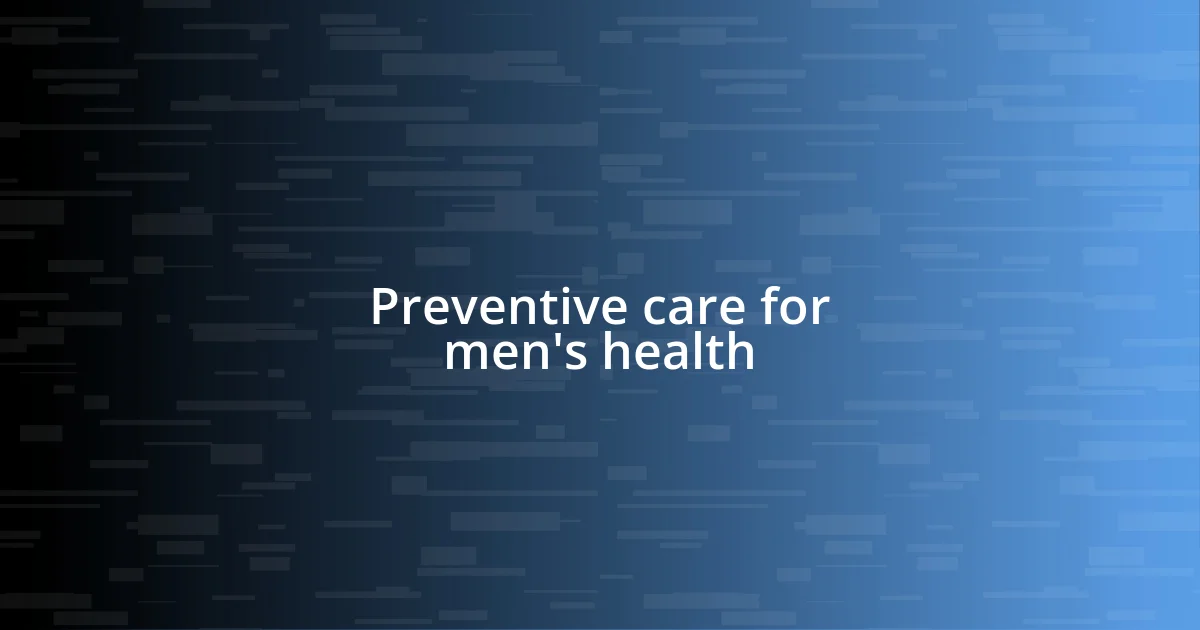
Preventive care for men’s health
Preventive care often takes a backseat in conversations about men’s health, yet it plays a crucial role. I vividly remember my first routine check-up; I was hesitant, thinking I was too young for such things. However, that appointment revealed high blood pressure I had no idea I had. It taught me that regular screenings aren’t just for those who feel unwell—they’re a proactive way to catch potential issues before they escalate. Have you had a routine exam that changed your perspective on health?
Another aspect I’ve come to appreciate is the importance of vaccinations. Growing up, I thought vaccines were just for kids, but I was mistaken. When I got the flu vaccine one year, I realized it wasn’t just about protecting myself; it also safeguarded those around me. It’s all about community health, and I started to see my health choices as interconnected with the wellness of others. Have you thought about the impact of your health decisions on those you care about?
Lastly, I’ve found that making lifestyle choices—like prioritizing sleep and maintaining a balanced diet—significantly contributes to preventive care. I was once someone who dismissed sleep as a minor concern, thinking I could power through on caffeine alone. But after consistently sacrificing that rest, I noticed my focus and mood plummeting. It struck me then: sleep isn’t just a luxury; it’s a cornerstone of good health. Do you often reflect on how your daily habits shape your overall wellness?
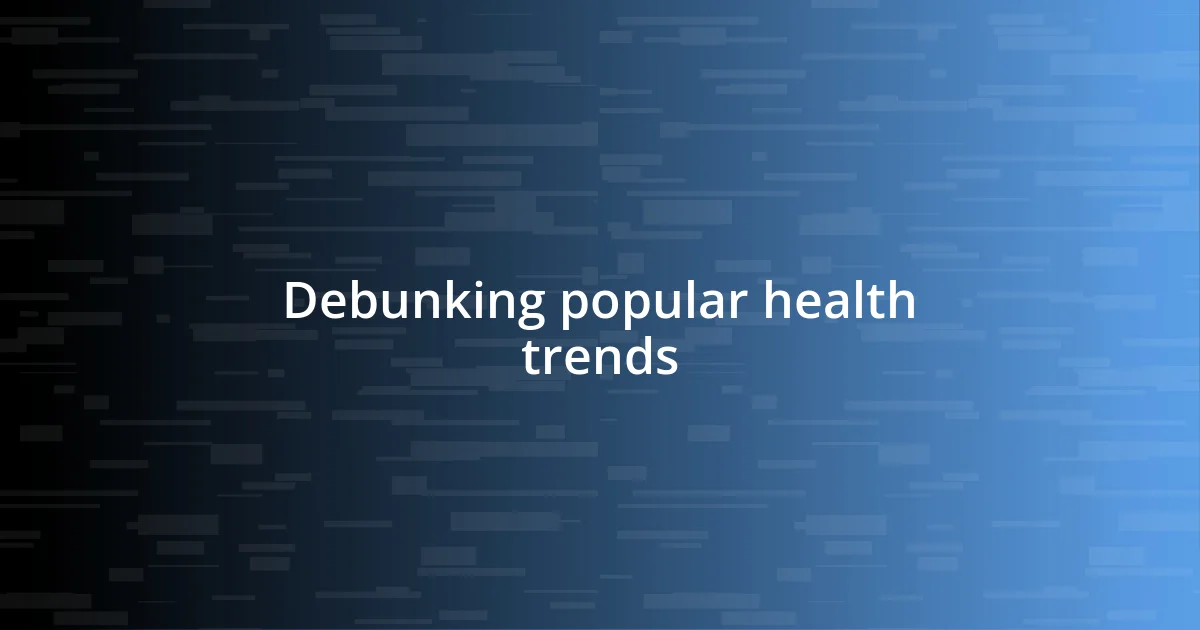
Debunking popular health trends
There always seems to be a new health trend circulating, and it’s easy to get swept up in the excitement. I remember when intermittent fasting became all the rage. I jumped right in, convinced that skipping breakfast would magically transform my health. But after a few weeks, I noticed my energy levels were in a rollercoaster ride, swinging from highs to lows. What I learned is that each body is unique, and what works for one person may not work for another. Have you ever tried a trend that left you feeling less than great?
Another trend that caught my eye was the obsession with detox diets. I was intrigued by the idea of flushing out toxins and restoring my body to its “natural state,” but my experience was far from enlightening. I ended up starving myself of nutrients, feeling sluggish and irritable instead of rejuvenated. It took me a while to realize that our bodies are already equipped to detoxify through liver and kidney functions; extreme diets only add stress. Have you ever felt misled by a popular health trend?
Finally, the fitness industry thrives on the notion that more exercise always equals better health. I once believed that I needed to hit the gym every day for hours. I pushed myself relentlessly until my body started to protest. It took a realignment of my perspective to see that balance is vital—finding joy in movement rather than punishment. This balance has transformed my approach to health, helping me appreciate activities that nourish rather than exhaust. How do you find that sweet spot in your routine?
